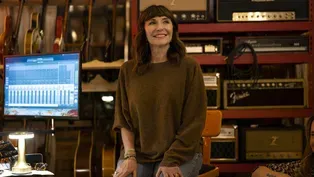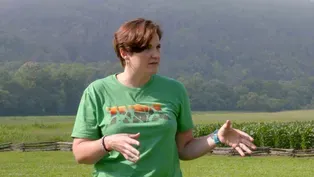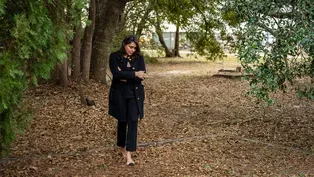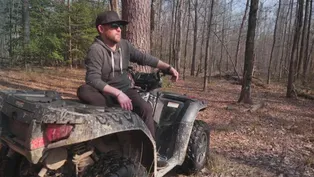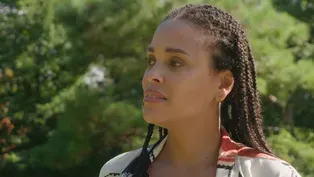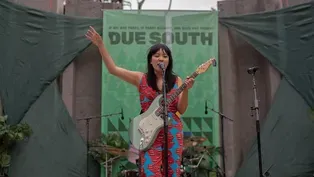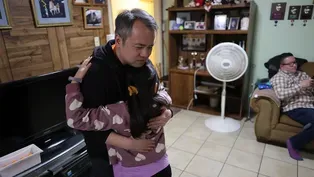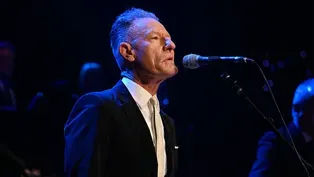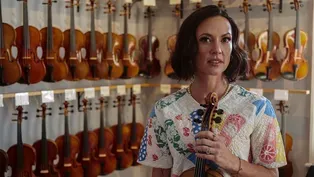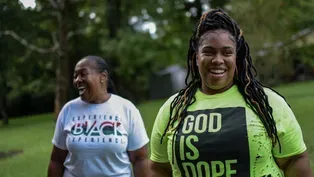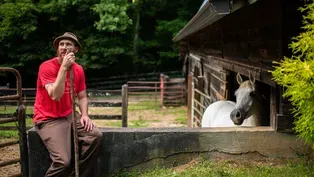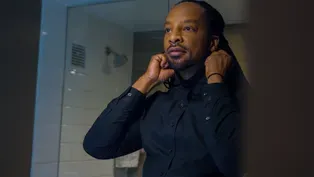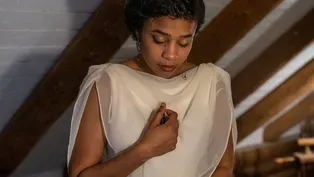
Author David Joy with Annette Saunooke Clapsaddle
Clip: Season 1 | 4m 38sVideo has Closed Captions
Annette Saunooke Clapsaddle takes David Joy to Kituwah Mound.
Annette Saunooke Clapsaddle is the author of "Even As We Breathe" and a citizen of the Eastern Band of Cherokee Indians. Annette takes author David Joy ("Those We Thought We Knew") to Kituwah Mound, the "most sacred place for the Cherokee."

Author David Joy with Annette Saunooke Clapsaddle
Clip: Season 1 | 4m 38sVideo has Closed Captions
Annette Saunooke Clapsaddle is the author of "Even As We Breathe" and a citizen of the Eastern Band of Cherokee Indians. Annette takes author David Joy ("Those We Thought We Knew") to Kituwah Mound, the "most sacred place for the Cherokee."
How to Watch Southern Storytellers
Southern Storytellers is available to stream on pbs.org and the free PBS App, available on iPhone, Apple TV, Android TV, Android smartphones, Amazon Fire TV, Amazon Fire Tablet, Roku, Samsung Smart TV, and Vizio.
Buy Now
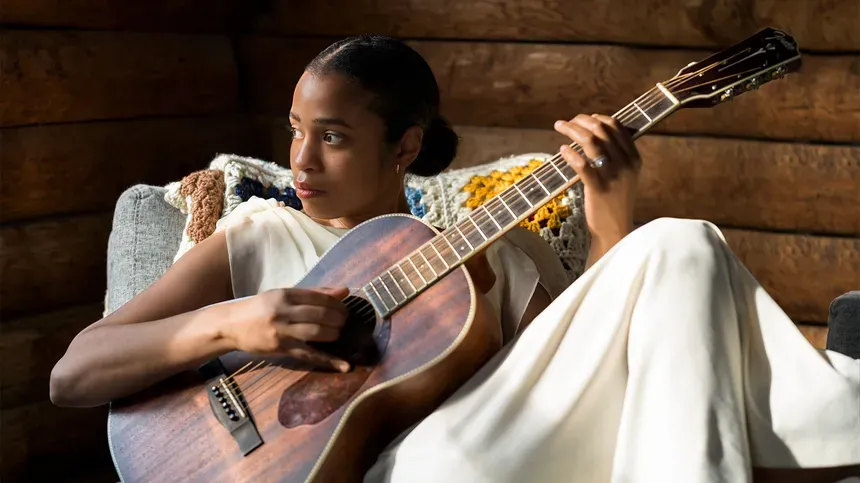
More from Southern Storytellers
We're highlighting the music, literary, and film creators featured in the show. Explore the recommended reading list, the Southern Storytellers Spotify playlist, and more.Providing Support for PBS.org
Learn Moreabout PBS online sponsorship[crickets chirping] - I'm going to see a friend of mine named Annette Saunooke Clapsaddle.
She's Native Cherokee, real fantastic writer, and this is Cherokee Homeland.
This is where the Cherokee were historically.
- So Dad painted that bear up there.
But there's a lot less of it than when I was growing up and everything now has to be labeled if it's actually Cherokee made or not.
See, like a section up there is all handmade Cherokee.
So that's my grandfather Ossly.
My dad is a little baby right there.
This is my dad and my aunt, and my aunt and my uncle.
And this is where we make the, the grits and corn meal.
[David] Where were those first people who were coming here as tourists, what were they, like how did they wind up here?
- When the Great Smoky Mountains National Park opened up, that really created an influx, but prior to that, there was also these kind of tourists who came to the Appalachian region with the arts and crafts, but really the National Park is the biggest reason.
My mom grew up here.
One of those little motels that we passed, her dad owned and so she grew up in town, and then they moved up the hill here, Schoolhouse Hill and lived up there.
[David] Describe Cherokee when you were growing up.
- The economy's always been tourism-based.
You know, I've worked in my dad's shop growing up and people come through and say things like, "Where's the reservation?
Where can I see the Indians?"
And you're standing on the reservation and you're talking to an Indian, you know, so, you know, it's comical, and I think that's the way we've always approached dealing with tourists and Cherokee is just take it with a grain of salt.
They help pay the bills and they're really funny and you can get some good stories out of 'em.
This is the most sacred place for the Cherokee.
It's the place where everything began.
So this is the center of the world, in case you were curious where that is.
Kadua is a place that we believe we all came from.
This is the most important place for Cherokee.
- If you were to ask somebody from California what Appalachia looks like, it's gonna be a white guy with a beard, overalls, probably barefooted, probably got a moonshine still, but regardless, it's gonna be a white guy.
[Annette] Yeah.
- And so we've refused to recognize the presence of people of color and I think that happens kind of all over the country, but what's really interesting to me about that here is that this is Cherokee country.
It's not so much that we dismiss those stories, it's that we completely ignore them, we overlook it, and I just don't, I don't know why.
- Cherokee culture, Native culture in general is, is... seen as the historical part of the American narrative, right?
We were the first couple of chapters and those characters die off and never returned.
But, luckily they're in our bloodstream somewhere way down there, right, and we can call on that if it behooves us, or, you know, it serves us in some way, but I think that's the biggest misconception is that it's dead, that it's old, that it's, you know, it's not living.
We've largely been in rural places and technology has changed that.
I think, you know, a lot of people are saying, "Why do they care about mascots now?"
Well, shoot, we've always cared about these things, but you couldn't hear our voices and now you hear our voices.
We've taken care of this land a lot longer than anybody else, so hopefully we can continue to do that.
This whole area is full of people who've lived through broken promises.
- Yeah.
[both laughing] [crickets chirping]
How Storytelling Endures In the South
Video has Closed Captions
The creators explore Southern culture and how storytelling remains vital in the South. (1m 30s)
Author David Joy with Annette Saunooke Clapsaddle
Video has Closed Captions
Annette Saunooke Clapsaddle takes David Joy to Kituwah Mound. (4m 38s)
Natasha Trethewey Returns to New Orleans
Video has Closed Captions
Pulitzer Prize winner Natasha Trethewey returns to New Orleans. (2m 31s)
Justin Moore Discusses the Inspiration for His Songwriting
Video has Closed Captions
Justin Moore shows us the land he grew up on and remembers his grandfather. (1m 13s)
Jesmyn Ward Reads From Her Memoir 'Men We Reaped'
Video has Closed Captions
Two-time National Book Award winner Jesmyn Ward reads from her memoir "Men We Reaped." (2m 13s)
Video has Closed Captions
The series continues as Southern creators take us home to the places that define them. (30s)
Screenwriter Qui Nguyen on Storytelling
Video has Closed Captions
Screenwriter Qui Nguyen was given the gift of storytelling by his grandmother. (1m 14s)
Grammy Award Winner Lyle Lovett and His Love for Horses
Video has Closed Captions
Grammy Award winner Lyle Lovett has a soft spot for horses. (1m 29s)
Video has Closed Captions
Six of the South’s native creators take us home to the places that define their work. (30s)
Author Angie Thomas Talks About Being Bullied
Video has Closed Captions
Author Angie Thomas ("The Hate U Give") loves writing for young people. (1m 35s)
Southern Book Prize Winner David Joy
Video has Closed Captions
Living in North Carolina, Novelist David Joy writes about a place "misunderstood." (4m 35s)
Pulitzer Prize Winning Poet Jericho Brown
Video has Closed Captions
Poet Jericho Brown delivers a powerful spoken word poem. (2m 15s)
Video has Closed Captions
Five noted creators of literature, music and film reveal deep ties to the American South. (30s)
Providing Support for PBS.org
Learn Moreabout PBS online sponsorship